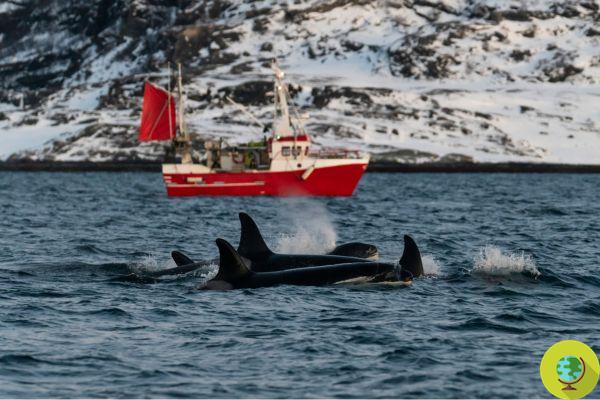
A recent study reports that killer whales have learned to turn fishing nets and lines into free buffets, and are sharing their experience with others.
Climate change and overfishing have made the oceans hostile to marine life. But, faced with the loss of habitat and the scarcity of food generated by humans, the killer whales try to adapt and still amaze us with their intelligence and resilience, transforming the fishermen's nets into real free buffets from which to use.
Fishing, an opportunity for killer whales
According to a recent study published in Biology Letters, killer whales use fishing as a feeding opportunity. The international team of researchers reports that these extraordinary marine mammals they learned to catch fish from fishermen's nets and lines and share their experience by training each other.
Researchers studied the feeding behavior of two groups of killer whales living near the Crozet Islands in the southern Indian Ocean. In this archipelago since the 90s, commercial fishing for snubfish has gradually increased. To catch it, longlines are used along the ocean floor, which use large lines with a large number of hooks.
Since the 2000s, due to the decline of the Patagonian snapper population, it has become more difficult for killer whales to catch this fish. Over time, however, they have transformed this fishing into a golden opportunity and have come to the point of using fishing lines as a "free buffet". In fact, the scientists, analyzing data from 2003 to 2018, noted that accidents caused by killer whales eating captured fish, called "predation", have gradually increased over time.
This approach seems to be due to the fact that individual killer whales learn each other's behavior. While in 1996 it was reported for the first time that, among the populations studied by the scientists, only one orca had fed on the fish caught while fishing, by 2014, 80 of the 100 orcas in the group had started doing the same thing. In addition, in recent years, particularly between 2010 and 2017, the number of killer whales has been found to have increased from 17 to 43.
Killer whales are not thieves
The news was reported in various media, indicating the killer whales as "thieves" or as real "plunder specialists". However, considering that it is the fishing industry itself and the marine pollution caused by humans that bring imbalance in the seas and oceans, who steals from whom? Scientists themselves believe this is innovative behavior to allow them to adapt.
This study illustrates how human activities, by altering the availability of resources in ecosystems, can lead to new behaviors that spread among individuals of species capable of innovating in response to changes in their environment, ”the research reads.
On the other hand, who would struggle to fish if they already had a buffet ready in front of them? Cheers to the resilience of the killer whales!
Follow your Telegram | Instagram | Facebook | TikTok | Youtube
Fonte: Royal Society
READ also:
- Locked up in a water park for 40 years, Kiska bangs her head against the tub in desperation. Let's save the loneliest killer whale in the world!
- The cruel hunting of blue whales by killer whales is documented for the first time
- Spot two beautiful and rare white killer whales off the Japanese coast
- The mystery of the killer whales attacking ships in Spain and Portugal


























